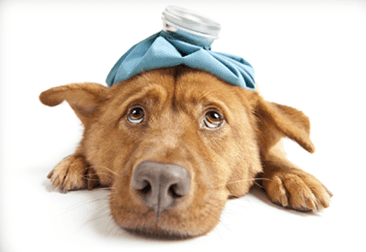Alicia Howser, DVM
April 21, 2015
I am not going to give you a definitive “yes” or “no” answer to this question. You have to decide if it is best for your dog, just like you decide if you should get the flu shot every year yourself. What I am going to do is give you some more information to help you make an informed decision. For starters, let’s address these 3 questions:
- Is your dog going to be around a lot of other dogs or in an endemic area? If you take your dog to a setting like a dog show where they will be in close contact with a high volume of dogs, it is worth considering getting the flu vaccine. When dogs are around a lot of other dogs, it increases their chances of coming into contact with one that is shedding the virus. So dogs in shelters or dogs that go to dog shows are at higher risk of being exposed. 20% of dogs that are infected with the virus will not show clinical signs, but they still shed the virus.
- Is your dog young, old, or sick? If so, these are the most “at-risk” groups for catching the flu, just like in people. Their immune system is weaker than the average healthy adult dog. This does not necessarily mean that you should get the vaccine if you have an animal that fits into one of these groups. What it does mean is that you should minimize their chance of exposure. If you have to take your pet somewhere like a boarding kennel or the groomer, it would be worth calling a day or two ahead to see if they have had any recently sick animals showing signs of respiratory distress.
- How effective is the vaccine? In a study performed in 2011, which tested the efficacy of the vaccine, in the group of dogs that were vaccinated, only about 40% did not develop clinical signs. The other 60% did develop mild signs for a couple of days. What you have to keep in mind is that the canine flu vaccine is static, meaning it is not updated every year like the human shot to try to protect against the newest strain of the flu. Therefore, it may be less effective against the current flu strain causing this year’s disease.
You also need to know that the canine influenza vaccine is not a core vaccine; it is a “lifestyle” vaccine. The decision to vaccinate is ultimately up to you. If it will help you sleep at night knowing your dog is vaccinated, by all means, do so. But if you decide not to get your dog vaccinated, here are some pointers to help minimize your dog’s chances of getting the flu:
- Minimize exposure. Do not expose your dog to a lot of other dogs.
- Keep your environment clean. Wipe down surfaces with disinfectant, wash your hands after touching other dogs, and wash your dog’s bedding, food, water bowls, collars, and leashes.
In general, for the everyday pet owner, most veterinarians agree that administering the vaccine on an annual basis is not necessary, except under the circumstances listed above.
If you’re concerned that your dog has been exposed, if they were going to develop clinical signs, it would occur 2-4 days after exposure. Clinical signs are vague and common to many respiratory diseases, including: cough, discharge from eyes and/or nose, sneezing, lethargy, and anorexia. In severe cases, dogs can develop pneumonia and a high fever. So if you are concerned, please have your dog checked by your veterinarian.
Sources:
AVMA
Clinical and Vaccine Immunology – ‘Efficacy of the Canine Influenza Virus H3N8 Vaccine to Decrease Severity of Clinical Disease after Cochallenge with Canine Influenza Virus and Streptococcus equi subsp. zooepidemicus’
Indiana State Board of Animal Health

